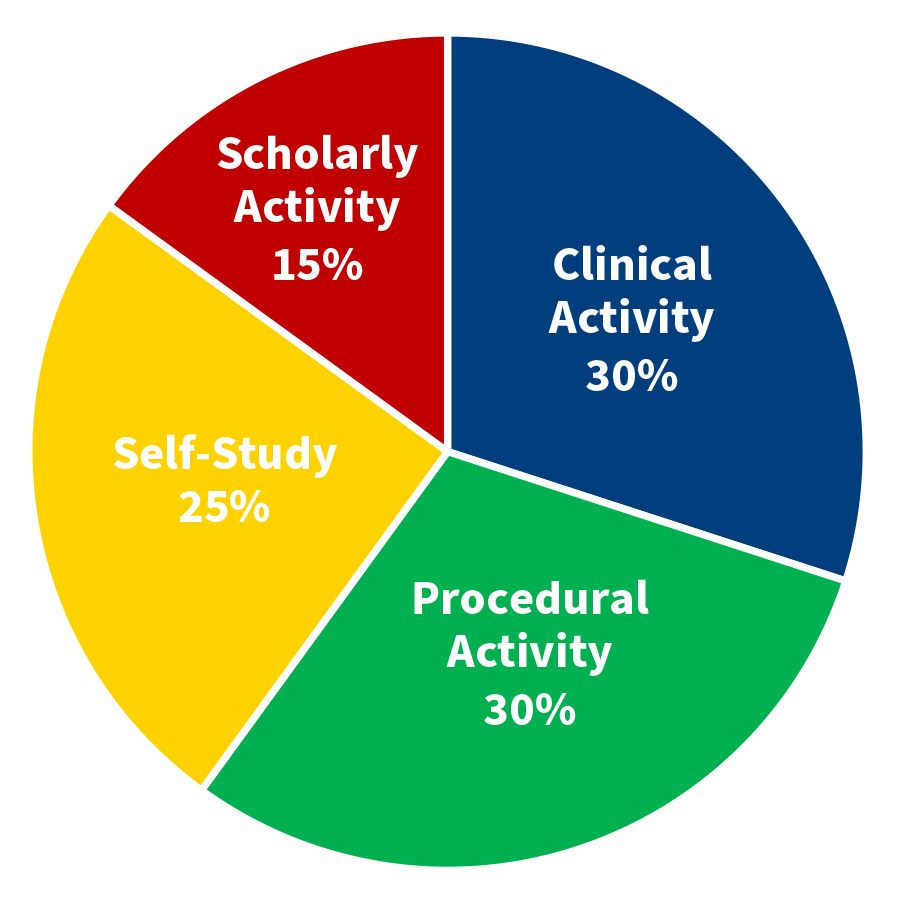Program Curriculum
<< Back to fellowship homepage
At the end of the fellowship training, the sleep medicine fellow will become proficient in the following areas:
- Sleep-wake physiology, normal sleep and variants
- Sleep study interpretation, scoring and staging
- Circadian rhythm sleep-wake disorders
- Insomnia
- Central disorders of hypersomnia
- Parasomnias
- Sleep-related movements
- Sleep-related breathing disorders
- Sleep in other medical and psychiatric disorders
- Sleep instrumentation and testing
Education & Training
Throughout the 12 months of sleep medicine education and training, the fellow’s time and effort will be divided and dedicated into four areas:
- Clinical Activity (30%)
- Procedural Activity (30%)
- Self-Study (25%)
- Scholarly Activity (15%)

Evaluation
To track the progress and achievement of milestones during the course of the sleep medicine training, the fellow will be evaluated on the following ACGME Competencies:
- Patient Care and Procedural Skills
- Medical Knowledge
- Systems-Based Practice
- Practice-Based Learning and Improvement
- Professionalism
- Interpersonal and Communication Skills
The Program Director will meet with the sleep medicine fellow on a regular basis to review their performance and receive feedback regarding their learning progress, the quality of faculty teaching and to dynamically modify the program to meet the fellow’s needs. Potential research as well as ongoing research projects will also be critiqued at these meetings.
Work Hours
The actual number of work hours may vary depending on the weekly clinical workload. But in accordance to current ACGME guidelines, clinical and educational work hours will be limited to no more than 80 hours per week, averaged over a four-week period. Fellows will have eight hours off between scheduled clinical work and education periods. Self-study is not considered part of the clinical work or education period. Fellows are not on-call, but there may be rotation-specific exceptions.
Depending on the rotation, fellows typically have weekends off, but there may be occasions where fellows will have to use the weekend to complete their clinical work (e.g., reading sleep studies). With the electronic health record and the capability to access sleep studies remotely, completion of clinical work may be accomplished at home while adhering to the 80-hour maximum weekly limit. However, the fellows are expected to complete most work on site during scheduled clinical work hours without requiring them to take work home.
Fellows in the UToledo Sleep Medicine Fellowship Program may be eligible to moonlight only if they are in good academic standing with the program and only with the written permission of the Program Director. Moonlighting will be counted toward the 80-hours maximum weekly hour limit on clinical and educational work hours. Fellows on J-1 visas are not eligible and are not permitted to moonlight.
The UToledo Sleep Medicine Fellowship Program takes burnout, fatigue, and sleep deprivation very seriously. For more information on resident/fellow wellness, visit the college Wellness website.
Mission Statement and Aims
The Mission of the Sleep Medicine Fellowship Program in the University of Toledo College of Medicine and Life Sciences is to provide excellent clinical and research training to physicians in the field of sleep medicine so that they can improve sleep health and provide high quality, patient-centered care in their own communities.
The Program’s Aims are to give fellows supervised experiences in the evaluation and management of a wide variety of acute and chronic conditions in sleep and circadian rhythm. These include insomnia, sleep related breathing disorders, central disorders of hypersomnolence, circadian rhythm sleep-wake disorders, parasomnias, and sleep related movement disorders as well as how these conditions affect patients’ other co-morbidities and overall health and medical well-being. Upon completion of training, fellows will demonstrate competence in basic and clinical knowledge, clinical judgement, procedural skills, and professionalism necessary to provide excellent care in sleep medicine and become advocates of sleep health in their own communities.
About the UToledo College of Medicine and Life Sciences
Located in the City of Toledo, the College of Medicine and Life Sciences has had a primary goal of providing high quality health care education since its doors first opened in 1964 (read more about its history here). In May 2015, The University of Toledo College of Medicine and Life Sciences announced a partnership with Toledo-based health system ProMedica. The partnership establishes a 50-year affiliation between the College and the health system that enriches the quality of medical education and expands clinical training capacity in Toledo. Learn more about the affiliation.
Sleep Fellowship Home Page How to Apply Program Faculty
Pioneers of Sleep in Toledo and Northwest Ohio UToledo Sleep in the Media


